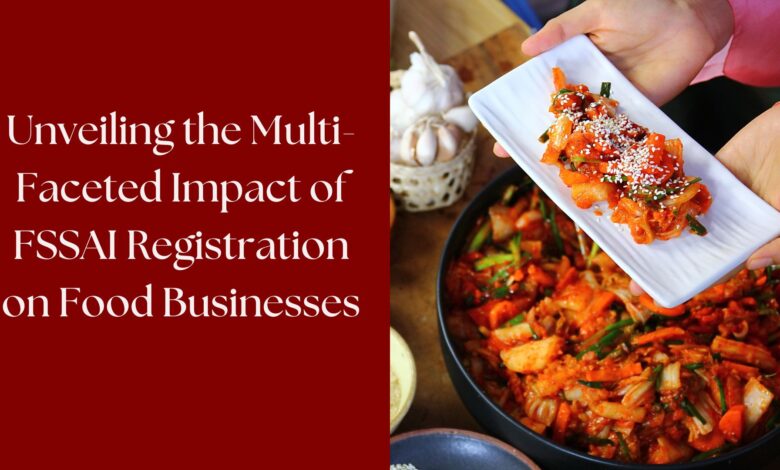Unveiling the Multi-Faceted Impact of FSSAI Registration on Food Businesses

Mitigating Liabilities and Safeguarding Brand Reputation
Beyond the legal mandate, FSSAI registration serves as a shield against potential liabilities and risks for food businesses. By adhering to stringent food safety standards, businesses can minimize the risk of contamination, spoilage, and product recalls. This proactive approach not only ensures consumer safety but also shields businesses from costly legal battles and damage to brand reputation that may arise from food safety incidents. Thus, investing in FSSAI Registration translates into long-term cost savings and risk mitigation, reinforcing the importance of regulatory compliance as a strategic imperative for sustainable business growth.
Driving Innovation and Market Differentiation: Fostering Product Development and Consumer Engagement
FSSAI registration fosters a culture of innovation and improvement within the food industry. The rigorous standards set by the FSSAI compel businesses to continually innovate and upgrade their processes, ingredients, and technologies to meet or exceed regulatory requirements. This commitment to quality and safety not only enhances consumer trust but also spurs the development of healthier, more sustainable food products that resonate with evolving consumer preferences and market trends. Furthermore, FSSAI registration empowers businesses to differentiate themselves in the market by highlighting their compliance with food safety standards, thereby enhancing consumer confidence and loyalty. In essence, FSSAI registration catalyzes product innovation, market differentiation, and consumer engagement, driving business growth and competitiveness in the dynamic food industry landscape.
Access to Finance and Investment Opportunities: Unlocking Growth Potential and Expansion
FSSAI registration enhances access to finance and investment opportunities for food businesses. Banks, investors, and lenders often view FSSAI registration as a positive indicator of a company’s reliability, credibility, and commitment to best practices. This perception makes it easier for registered businesses to secure loans, attract investment, and access financial support for expansion, research, and development initiatives. By obtaining FSSAI registration, businesses can unlock growth potential, accelerate expansion plans, and capitalize on emerging market opportunities, thereby fueling long-term success and sustainability in the competitive food industry ecosystem.
Enhanced Market Competitiveness and Brand Reputation: Establishing a Strong Presence in the Market
FSSAI registration plays a pivotal role in enhancing a food business’s market competitiveness and brand reputation. With consumers becoming increasingly discerning about the safety and quality of the food they consume, FSSAI registration serves as a powerful differentiator. It signifies that a business complies with stringent food safety standards and regulations, instilling confidence in consumers about the product’s safety and quality. As a result, businesses with FSSAI registration are often preferred over non-registered competitors, gaining a competitive edge in the market. Moreover, FSSAI registration provides businesses with a platform to communicate their commitment to food safety and quality, thereby enhancing brand reputation and loyalty among consumers. By leveraging FSSAI registration to establish a strong presence in the market, businesses can attract new customers, retain existing ones, and ultimately drive growth and profitability.
Consumer Education and Engagement: Building Trust and Loyalty Through Transparency
FSSAI registration offers food businesses an opportunity to educate and engage consumers on the importance of food safety and quality. By prominently displaying the FSSAI logo on packaging, promotional materials, and online platforms, businesses can communicate their adherence to regulatory standards and their commitment to consumer safety. Additionally, businesses can use FSSAI registration as a platform to provide valuable information about their products’ ingredients, sourcing practices, and manufacturing processes, fostering transparency and trust among consumers. Through educational initiatives, such as workshops, seminars, and social media campaigns, businesses can empower consumers to make informed choices about the food they consume, thereby strengthening brand loyalty and driving long-term success.
Continued Compliance and Continuous Improvement: Sustaining Success Through Ongoing Efforts
While obtaining FSSAI registration is essential, maintaining compliance and continuously improving food safety practices are equally critical for long-term success. Businesses must remain vigilant and proactive in adhering to FSSAI regulations, conducting regular audits, and implementing robust quality control measures. Moreover, businesses should strive for continuous improvement by embracing new technologies, best practices, and innovations in food safety and quality management. By prioritizing ongoing compliance and improvement efforts, businesses can not only sustain their FSSAI registration but also enhance their competitiveness, mitigate risks, and drive growth in the ever-evolving food industry landscape.
Note: Now apply for fssai license renewal through fssai portal.
In conclusion, FSSAI registration is not just a legal requirement but a strategic imperative that encompasses market competitiveness, brand reputation, consumer education, and continuous improvement. By embracing FSSAI regulations and leveraging registration for business advantage, food businesses can navigate the complexities of the industry, build trust and loyalty among consumers, and drive sustainable growth and success in the dynamic food market. Ultimately, FSSAI registration serves as a cornerstone of excellence, integrity, and innovation in the pursuit of safe, quality food for all.




